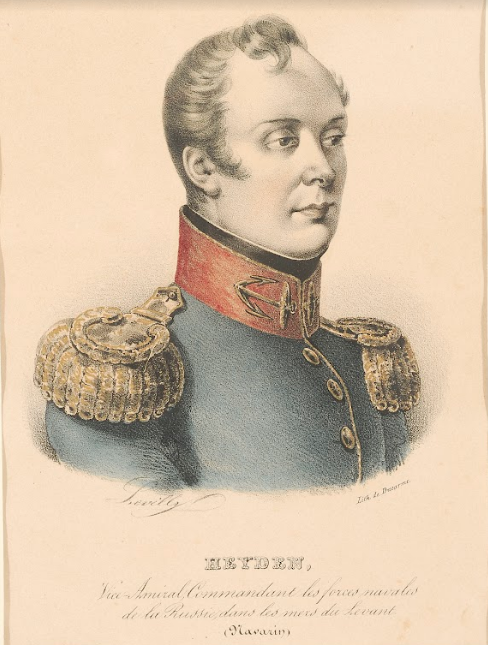Lodewijk van Heiden ( 1772-1850 )

Dutch Admiral of the Russian navy Lodewijk Sigismund Vincent Gustaaf Reichsgraf van Heiden was commander of a Russian squadron in the Mediterranean in 1827 and fought in the Battle of Navarino.
He was born in 1772 in The Hague to a noble family. He joined the Dutch navy at a very young age and distinguished himself in several actions against pirates in the Mediterranean Sea and the Indian Ocean.
When the French army invaded the Netherlands, in 1795, during the Napoleonic Wars, he returned to his country and fought alongside the stadtholder of the Dutch Republic, William V. In the ensuing turmoil, Heiden managed to get the stadtholder’s family and himself away in a fishing boat to England. On his return, he was arrested and imprisoned by the French authorities, but managed to escape and take refuge in Russia.
In 1810, when he found out that Holland was absorbed into the French Empire, he became a Russian citizen and, with the Tsar’s permission, retained the family title of Count. He fought in the Napoleonic Wars and in 1817 was promoted to the rank of admiral by the Tsar Alexander I.
In 1827, with the Treaty of London, the three main European powers – Great Britain, France, and Russia – called for an immediate cessation of hostilities between the Ottoman Empire and the Greeks as a necessary condition for negotiations to begin. The squadrons of the three Great Powers were ordered to sail to the Greek seas to ensure enforcement of the treaty provisions.
Heiden departed with the flagship Azov and seven other warships from the port of Kronstadt and arrived in early October 1827 at Navarino, where he joined Codrington and de Rigny, commanders of the British and French fleets. The three admirals urged Ibrahim to observe the ceasefire or suffer the consequences. Ibrahim largely ignored the admirals’ suggestions. When the combined fleet of the three European powers entered the Gulf of Navarino on October 8, 1827, the battle began, and the combined Turco-Egyptian fleet was crushed. Greece was finally set on the path to independence.
Heiden’s role in that landmark event was crucial. He supported Codrington in his decisions, recognising his seniority and experience in Eastern affairs. Heiden was a quiet, deeply cultured person. In his relations with his officers, he showed humanity and superiority, often passionately supporting the demands of his subordinates. He showed incredible bravery during the battle at Navarino and cooperated perfectly, especially with the British crews.
Heiden remained in Greece after the arrival of Kapodistrias in 1828 and collaborated with him, assisting in his efforts to combat piracy in the Aegean, especially in the Northern Sporades.
He returned to Russia in 1831 and was appointed adjutant to the Tsar Nicholas I.
Lodewijk van Heiden died in Reval (now Tallinn, Estonia) in 1850, aged 78





